Labor leader Anthony Albanese says national emergency is ‘enormous’ and there is a need for leadership on bushfire crisis
Scott Morrison has again stressed there is no need for panic, while urging evacuating Australians to remain patient, with the bushfire emergency showing no signs of abating.
But the prime minister said the national security committee of cabinet had been called for an emergency meeting on Monday to discuss the on-going response to the bushfires.
The prime minister made a point of acknowledging the link between reducing emissions and protecting environments against worsening bushfire seasons, but despite mounting criticism maintained his government’s current policies struck the right balance.
“Our climate policy settings are to meet and beat the emissions reduction targets, emissions reduction under our government is 50m tonnes more than the previous government and we want to see them continue for this country and continue to better the achievements we have already made, with measures that achieve that,” he said.
“Let
me be clear to the Australian people, our emissions reductions policies
will both protect our environment and seek to reduce the risk and
hazard we are seeing today. At the same time, it will seek to make sure
the viability of people’s jobs and livelihoods, all around the country.But the prime minister said the national security committee of cabinet had been called for an emergency meeting on Monday to discuss the on-going response to the bushfires.
The prime minister made a point of acknowledging the link between reducing emissions and protecting environments against worsening bushfire seasons, but despite mounting criticism maintained his government’s current policies struck the right balance.
“Our climate policy settings are to meet and beat the emissions reduction targets, emissions reduction under our government is 50m tonnes more than the previous government and we want to see them continue for this country and continue to better the achievements we have already made, with measures that achieve that,” he said.
After originally deflecting any talk of climate change policy during the bushfire crisis when it began in October last year, a move which was backed by the deputy prime minister, Michael McCormack, who accused those of making the link of being “inner city raving lunatics”, Morrison sought to reassure the public he was acting.
“Getting the balance right is what Australia has always been able to achieve,” he said. “Right now, the focus as I said at the outset, is to fight these fires, and get people to safety.
“That is what we are focused on, that is what state agencies are focused on, that is what the commonwealth is doing through defence forces and other agencies to lend everything that can be done to get that operational response in place, to get help to where it is needed, get people to places of safety and sustain the firefighting effort.”
Morrison also referred to the government’s plans to review “all contributing factors” to the prolonged fire season, which included the inquiry into land clearing, which was set up in early December, to review policies across the states.
“Other issues of how you manage hazard reduction are important because, as you say, the impact, more broadly, of climate change on these issues has a pronounced effect on the length of the fire season,” he said.
“That, equally then has a need to address issues around hazard reduction for national parks, dealing with land-clearing laws, zoning laws and planning walls around people’s properties and where they can be built in countries like Australia, up and down the coast. That being the case with the climatic effects of what we are seeing, there are many restrictions around those effects that have to be reviewed on the basis on the broader climatic effect we are seeing in this country.”
Thursday was Morrison’s first press conference since Sunday 29 December. Until then, the prime minister had not taken questions from journalists since 24 December.
The prime minister spent the morning attending the first of three funerals for Rural Fire Service volunteers killed while defending against the growing New South Wales fire front.
Across NSW, Victoria, and South Australia, 17 people have been confirmed dead in bushfires since October, while at least 17 people remain unaccounted for after the East Gippsland fires earlier this week.
Morrison said he could understand people’s frustrations but urged them to remain calm.
“I would continue to ask people to be patient,” he said. “I know you can have kids in the car and there is anxiety and there is stress and the traffic is not moving quickly but the best thing to do – the best thing that helps those out there volunteering, out there trying to restore some order to these situations is for everyone to be patient.
“That help will arrive. There are parts of both Victoria and NSW which have been completely devastated, with a loss of power and communications.
“Every absolute effort is in train to ensure that those things can be stood up as soon as possible.”
The Labor leader, Anthony Albanese, who has repeatedly highlighted the “constructive” role he has “tried to play here”, said he would leave judgment about Morrison’s response during the bushfire crisis “to others” but added Australia would be paying the cost for years to come.
“What we’re seeing, though, I think, is the need for leadership on these issues,” he said. “And, you know, I mean it’s quite right that there have been bushfires in Australia before.
“But what we are seeing is greater intensity, the season being longer, and, unfortunately, this could be the new norm and the devastation, and when we talk about economic cost, the economic cost of this crisis, this national emergency is enormous.”

No comments:
Post a Comment